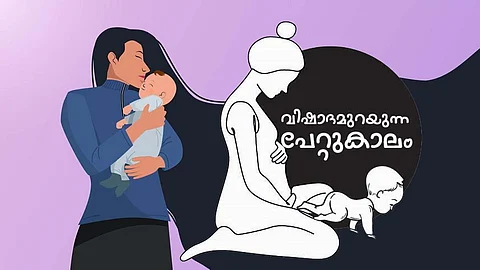

Neethu Chandran
A software engineer from Ernakulam recounted one of her most distressing memories of childbirth: the scalding burns she suffered while bathing in warm water. Her entire body was rubbed vigorously by the domestic help arranged for maternal care. This caused severe nerve damage that made it difficult for her to hold her baby. Despite her explanation, her educated family members misinterpreted her struggle as reluctance to take care of the baby.
She recalls a time when she endured harsh criticism from family members who accused her of being overly attached to holding children of relatives and friends without ever wanting to put them down. Frustrated and overwhelmed, she sometimes lost control and lashed out in anger at those around her, often impulsively grabbing whatever was within reach. Even now, those memories haunt her, leaving her deeply unsettled.
It was only during her second pregnancy that she fully grasped the gravity of the postpartum depression she had experienced after her first delivery. Determined not to repeat the ordeal, she gathered her family members and candidly recounted the challenges she had faced. This open dialogue ensured that after her second delivery, she navigated the postpartum period with significantly improved mental health and fewer complications.
Over the past decade, numerous studies have delved into postpartum depression, revealing a multifaceted array of triggers. It's widely understood that this mental state can stem from various factors such as previous episodes of depression, anxiety during pregnancy, encountered challenges, social isolation, nicotine use and the hormonal shifts following childbirth. These insights underscore the complex interplay of biological, psychological, and social factors influencing maternal mental health.
Before childbirth, the body experiences high levels of estrogen and progesterone hormones. However, within 24 hours of delivery, these hormone levels plummet significantly. Additionally, thyroid hormone activity decreases post-birth, contributing to fatigue and a sense of unease. This decline in thyroid hormone activity is linked to the onset of depression in some cases. These hormonal fluctuations illustrate the intricate physiological changes that can impact maternal mental health.
Dr. Peter Joseph recounts a poignant incident where a woman, amidst the rare turmoil of postpartum psychosis, tragically bit off her baby's arm. This devastating act was precipitated by a tumultuous combination of hormonal shifts and challenging social circumstances.
After her second delivery, a mother’s emotional state took a drastic turn when a thoughtless comment by a visitor about the child's complexion pushed her to a devastating decision – she attempted to poison the baby. Thankfully, swift intervention by friends and companions prevented a tragic outcome for both mother and child.
For a while, the mother was in the psychiatry ward while her child was treated in the ICU. Even after the baby recovered, accepting the child proved challenging for her. Sowmya J, a consultant psychologist at ICAS Lyra, mentions that it took considerable time to stabilize their situation. With more individuals identifying similar struggles, awareness about postpartum depression has grown, fostering open discussions. Lifestyle shifts and a growing willingness to seek therapy have also contributed to this heightened awareness.
A woman who conceived after a decade of treatments sought counseling for postnatal mental health concerns. Extensive medication taken to achieve pregnancy can also influence a woman’s emotional state. Fortunately, the hesitation to seek medical help for such issues is steadily declining.
However, Sowmya notes that many, regardless of their education, still find it challenging to consult a psychiatrist. Given this reluctance, one can only imagine the plight of those in the lower socio-economic strata, she adds.
Another pressing issue is the reliance on Google for diagnosing illnesses, leading to self-perceptions that are often misguided. Sowmya laments the current social situation in Kerala, noting the difficulty of correcting those who come to the doctor with preconceived notions.
Even today, some families insist that the mother must shoulder the entire responsibility of caring for the child alone. This insistence often forces mothers into a situation where they are unable to eat on time, sleep as long as they need, or even visit the restroom in peace.
The heart-wrenching revelation of Divya Johny, who tragically smothered her own child three years ago in Kundara, Kollam, as her postpartum depression escalated into psychosis, continues to resonate on YouTube. Beneath the video, a myriad of comments from women recount their own harrowing experiences and share their journeys of overcoming this crisis. These comments reveal a poignant truth: many women in Kerala endure their harrowing struggles in silence, often surviving on their own without confiding in anyone about the depths of their pain.
There is no doubt that without the implementation of more effective strategies to combat postpartum depression, the number of abused children and distressed mothers will inevitably continue to rise.
(Concluded)
